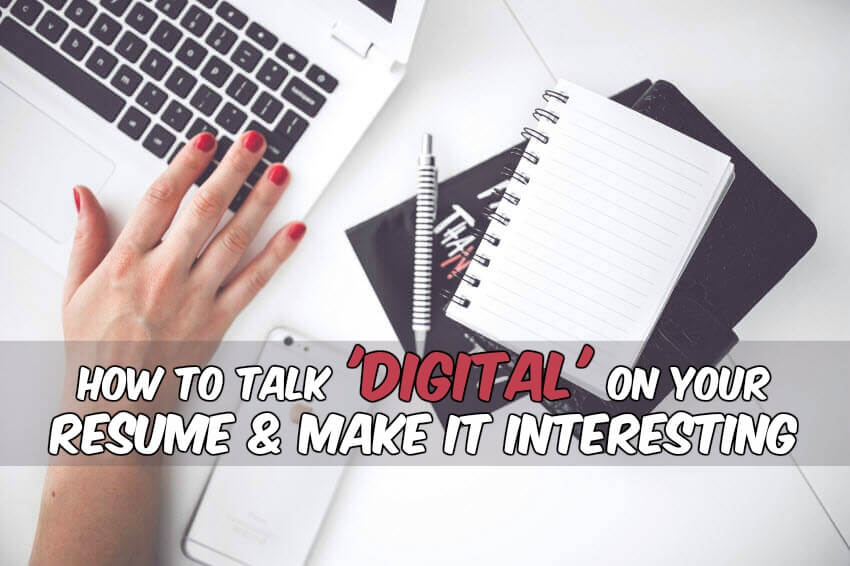Looking to land yourself a new digital role in 2018? One thing’s for sure: if you hope to find yourself in a creative marketing position, you’d better be good at creatively marketing yourself. Writing a resume can feel pressured and uncomfortable – we don’t all enjoy turning the spotlight on ourselves. And generally speaking, the competition is pretty fierce.
Selling yourself as a potential employee in the digital industry is a little different to other, more traditional job roles. There’s more room for creativity and innovation – within reason. With your resume, you have an opportunity to position yourself ahead of the curve. Here’s how.

A CV is no longer constrained to two sides of A4. There are some pretty impressive resumes out there, particularly in creative industries such as web design and digital marketing. Some have clearly undergone a lot of effort, but you don’t need to spend hours to create something sleek and engaging. Using one of Canva’s creative resume templates might be just the final flourish you need.
Depending on the role you’re applying for, a bland and uninspiring CV could even hurt your chances of landing a role. If you’re in the business of graphic design or UX, for example, an employer might expect to see evidence of your skills coming across in your presentation. Increasingly, embedded PDFs, videos and other interactive elements are becoming a popular way to showcase your talent.
Nowadays, a hard copy of your CV won’t necessarily be what hiring managers are after. Instead, they may expect you to send a digital resume – one you can link them to directly. This give you scope to really open up what you include, be that links, videos, animation, imagery, or infographics. Here are some examples of digital resumes that really pushed the boat out.
As a ‘creative type’, there’s no harm in going all out, if you have the resources to do so. You can even use your website to host your resume – or build a microsite specifically for that purpose. This in itself shows that you’re digitally savvy.
The design of your resume is certainly important if you want to give employers the ‘wow’ factor. But just as important as the design is the content itself. You’ve got to have substance, as well as style. Using language that’s too technical, or littered with agency jargon, is unlikely to impress anyone.
It helps to observe the company’s tone of voice before you start writing. Are they playful and informal, or do they write in a sophisticated, professional tone? Adopting elements of their tone into the way you write will help to demonstrate that you’d be a good fit. Start your resume with good content, and add the bells and whistles later.
We all have something to offer that no-one else has. A unique mix of skills, knowledge and interests that we bring to our careers. As you compose your resume, you must figure out what it is that makes you different to all the other candidates the employer might be seeing. Say you’re applying for a digital copywriting position – if have complementary experience of on-page optimization or managing an ecommerce website, this will stand you in good stead.
In addition, you will need to tailor which aspects of yourself you focus on, depending on what the individual company is looking for. Define your value proposition and make this absolutely clear to potential employers right from the start.
In a lot of creative fields and digital roles, what employers are most keen to see is your portfolio. This is where they find out what you can really do. So it needs just as much love and attention as your resume.
Your portfolio should be clear and well-organized, with contextual details, such as the outcome of each campaign. Some career advisors suggest building out your portfolio as a priority to get some real-world experience, before you even think about handing out CVs. Class projects can also become strong portfolio pieces, if they received good feedback.
Here are some creative portfolios to get you feeling inspired.
Digital agencies tend to be quite progressive, full of trendy young people with diverse interests. When reading your CV, hiring managers will be looking at whether you’re a good fit for their company culture, as well as professionally. Therefore, always make room to talk about your passions – be it music, fashion, climbing, or whatever. Even if they’re not related to the job, they say a lot about your character.
Companies like HubSpot and Buzzfeed actively look for individuals that are well-rounded and full of enthusiasm. Having a diverse range of interests could work in your favor to show there are many strings to your bow. No-one wants to be sat next to ‘the boring person’ at work.
Spend a little time researching their company culture – social media profiles are helpful – and make some calls about what you’ll disclose and why.
What have you found to be most challenging about putting together a CV? Share your thoughts with us in the comments.

Victoria Greene is a freelance writer with a long history of covering social media topics. On her blog, VictoriaEcommerce, she covers updates in the social media world, along with ecommerce and digital marketing.
This entry was posted in Guest Posts, Positive Psychology.